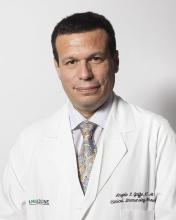User login
A recent analysis of the incidence of gout in men, published in JAMA Network Open, offers new insights on the role of lifestyle changes in preventing gout, particularly the importance of obesity and its modification.
Prior gout research, although it addressed lifestyle issues, had not quantified the impact of obesity on incident gout cases, noted first author Natalie McCormick, PhD, and colleagues at Harvard Medical School and Massachusetts General Hospital in Boston. “To date the proportion of actual gout itself that could potentially be prevented by modifying such risk factors remains unknown.” To address that lack of data, they set out to estimate the proportion of avoidable incident gout in a large database in the Health Professionals Follow-up Study, initially of some 51,529 male health professionals who have completed a biannual personal health questionnaire since 1986. The follow-up rate for completing these questionnaires exceeds 90%.
For their analysis, the researchers tracked 44,654 of these men, with an average age of 54 at the 1986 baseline and no history of gout, through the year 2012. They looked at four lifestyle risk factors attributed to gout: body mass index; alcohol intake; adherence to a Dietary Approach to Stop Hypertension (DASH)-style diet, which recommends less red meat and sweetened beverages and more fruits, vegetables, and low-fat dairy products; and the absence of diuretic drugs, which are used to treat blood pressure or heart failure, in order to observe and compare their effects on new reports of gout. Over the subsequent 26 years, nearly 4% of the men developed gout, the most common inflammatory arthritis. Obese men had 2.65 times greater risk for developing gout than did those with a normal body mass index.
If one addressed all four risk factors – modifying obesity, having no alcohol intake, not taking diuretic drugs, and following a DASH-style, lower-fat diet – 77% of new gout cases would disappear, the study’s corresponding author, Hyon K. Choi, MD, DrPH, of the division of rheumatology, allergy, and immunology at Massachusetts General Hospital, said in an interview. “But we learned that if you don’t include modifying obesity as a targetable risk factor, none of the other factors alone reaches significance. We can’t make firm conclusions about cause and effect, but modifying obesity seems to be a prerequisite to preventing gout through lifestyle. It’s a very interesting finding that needs to be confirmed in further research,” he said.
Of course, identifying the importance of lifestyle risk factors is not the same as actually achieving modifications of those factors. Changing lifestyle is difficult, Dr. Choi acknowledged. “But there’s not much potential for achieving the goal if the clinician doesn’t understand the target. Now we know obesity has a lot to do with gout. We can see it as a public health issue, especially since gout increases risks for comorbidities and mortality. All of these risk factors deserve intervention by the physician.”
A worldwide gout epidemic
Currently, there is a kind of worldwide gout epidemic linked to obesity, Dr. Choi said. The disease burden of gout is increasing worldwide. “This may be more of an issue for family practice or primary care physicians, who see 80%-90% of gout cases, rather than for rheumatologists, who are more likely to see advanced cases in need of drug therapy. But we would say: Don’t lose sight of the lifestyle risk factors, which are interrelated. This is not only the responsibility of one doctor or the other.”
The new findings should give practicing rheumatologists more confidence in addressing lifestyle issues, particularly weight loss, with their patients, said Angelo Gaffo, MD, section chief of rheumatology at the Birmingham VA Medical Center and associate professor of medicine in the division of rheumatology at the University of Alabama at Birmingham.
“Our patients with gout are interested in what they can do in their lives that might help with their gout. In the past, we’ve had generic advice about changing their diet. But in general, the evidence for the impact of dietary changes has not been strong.”
Doctors can now recommend a DASH-style diet, allowing room for moderate consumption of red meat, so long as patients are working on their weight loss – and showing results. “Now we have the information to give advice that’s more evidence-based,” Dr. Gaffo said. “You can ask the question whether this study is applicable to patients who already have gout. It doesn’t directly address them. But it mainly builds on the narrative that weight loss is important.”
Other studies have also looked at how weight loss led to serum urate reduction. This study adds to a growing body of literature emphasizing that the most important lifestyle factor relative to gout risk is weight gain, and the simplest, most effective intervention is counseling patients about weight loss, he said.
This research was supported by grants from the National Institutes of Health. Dr. Choi reported receiving research support from Ironwood and Horizon and consulting fees from Ironwood, Selecta, Horizon, Takeda, Kowa, and Vaxart. No other relevant financial disclosures were reported.
SOURCE: McCormick N et al. JAMA Netw Open. 2020;3(11):e2027421. doi: 10.1001/jamanetworkopen.2020.27421.
A recent analysis of the incidence of gout in men, published in JAMA Network Open, offers new insights on the role of lifestyle changes in preventing gout, particularly the importance of obesity and its modification.
Prior gout research, although it addressed lifestyle issues, had not quantified the impact of obesity on incident gout cases, noted first author Natalie McCormick, PhD, and colleagues at Harvard Medical School and Massachusetts General Hospital in Boston. “To date the proportion of actual gout itself that could potentially be prevented by modifying such risk factors remains unknown.” To address that lack of data, they set out to estimate the proportion of avoidable incident gout in a large database in the Health Professionals Follow-up Study, initially of some 51,529 male health professionals who have completed a biannual personal health questionnaire since 1986. The follow-up rate for completing these questionnaires exceeds 90%.
For their analysis, the researchers tracked 44,654 of these men, with an average age of 54 at the 1986 baseline and no history of gout, through the year 2012. They looked at four lifestyle risk factors attributed to gout: body mass index; alcohol intake; adherence to a Dietary Approach to Stop Hypertension (DASH)-style diet, which recommends less red meat and sweetened beverages and more fruits, vegetables, and low-fat dairy products; and the absence of diuretic drugs, which are used to treat blood pressure or heart failure, in order to observe and compare their effects on new reports of gout. Over the subsequent 26 years, nearly 4% of the men developed gout, the most common inflammatory arthritis. Obese men had 2.65 times greater risk for developing gout than did those with a normal body mass index.
If one addressed all four risk factors – modifying obesity, having no alcohol intake, not taking diuretic drugs, and following a DASH-style, lower-fat diet – 77% of new gout cases would disappear, the study’s corresponding author, Hyon K. Choi, MD, DrPH, of the division of rheumatology, allergy, and immunology at Massachusetts General Hospital, said in an interview. “But we learned that if you don’t include modifying obesity as a targetable risk factor, none of the other factors alone reaches significance. We can’t make firm conclusions about cause and effect, but modifying obesity seems to be a prerequisite to preventing gout through lifestyle. It’s a very interesting finding that needs to be confirmed in further research,” he said.
Of course, identifying the importance of lifestyle risk factors is not the same as actually achieving modifications of those factors. Changing lifestyle is difficult, Dr. Choi acknowledged. “But there’s not much potential for achieving the goal if the clinician doesn’t understand the target. Now we know obesity has a lot to do with gout. We can see it as a public health issue, especially since gout increases risks for comorbidities and mortality. All of these risk factors deserve intervention by the physician.”
A worldwide gout epidemic
Currently, there is a kind of worldwide gout epidemic linked to obesity, Dr. Choi said. The disease burden of gout is increasing worldwide. “This may be more of an issue for family practice or primary care physicians, who see 80%-90% of gout cases, rather than for rheumatologists, who are more likely to see advanced cases in need of drug therapy. But we would say: Don’t lose sight of the lifestyle risk factors, which are interrelated. This is not only the responsibility of one doctor or the other.”
The new findings should give practicing rheumatologists more confidence in addressing lifestyle issues, particularly weight loss, with their patients, said Angelo Gaffo, MD, section chief of rheumatology at the Birmingham VA Medical Center and associate professor of medicine in the division of rheumatology at the University of Alabama at Birmingham.
“Our patients with gout are interested in what they can do in their lives that might help with their gout. In the past, we’ve had generic advice about changing their diet. But in general, the evidence for the impact of dietary changes has not been strong.”
Doctors can now recommend a DASH-style diet, allowing room for moderate consumption of red meat, so long as patients are working on their weight loss – and showing results. “Now we have the information to give advice that’s more evidence-based,” Dr. Gaffo said. “You can ask the question whether this study is applicable to patients who already have gout. It doesn’t directly address them. But it mainly builds on the narrative that weight loss is important.”
Other studies have also looked at how weight loss led to serum urate reduction. This study adds to a growing body of literature emphasizing that the most important lifestyle factor relative to gout risk is weight gain, and the simplest, most effective intervention is counseling patients about weight loss, he said.
This research was supported by grants from the National Institutes of Health. Dr. Choi reported receiving research support from Ironwood and Horizon and consulting fees from Ironwood, Selecta, Horizon, Takeda, Kowa, and Vaxart. No other relevant financial disclosures were reported.
SOURCE: McCormick N et al. JAMA Netw Open. 2020;3(11):e2027421. doi: 10.1001/jamanetworkopen.2020.27421.
A recent analysis of the incidence of gout in men, published in JAMA Network Open, offers new insights on the role of lifestyle changes in preventing gout, particularly the importance of obesity and its modification.
Prior gout research, although it addressed lifestyle issues, had not quantified the impact of obesity on incident gout cases, noted first author Natalie McCormick, PhD, and colleagues at Harvard Medical School and Massachusetts General Hospital in Boston. “To date the proportion of actual gout itself that could potentially be prevented by modifying such risk factors remains unknown.” To address that lack of data, they set out to estimate the proportion of avoidable incident gout in a large database in the Health Professionals Follow-up Study, initially of some 51,529 male health professionals who have completed a biannual personal health questionnaire since 1986. The follow-up rate for completing these questionnaires exceeds 90%.
For their analysis, the researchers tracked 44,654 of these men, with an average age of 54 at the 1986 baseline and no history of gout, through the year 2012. They looked at four lifestyle risk factors attributed to gout: body mass index; alcohol intake; adherence to a Dietary Approach to Stop Hypertension (DASH)-style diet, which recommends less red meat and sweetened beverages and more fruits, vegetables, and low-fat dairy products; and the absence of diuretic drugs, which are used to treat blood pressure or heart failure, in order to observe and compare their effects on new reports of gout. Over the subsequent 26 years, nearly 4% of the men developed gout, the most common inflammatory arthritis. Obese men had 2.65 times greater risk for developing gout than did those with a normal body mass index.
If one addressed all four risk factors – modifying obesity, having no alcohol intake, not taking diuretic drugs, and following a DASH-style, lower-fat diet – 77% of new gout cases would disappear, the study’s corresponding author, Hyon K. Choi, MD, DrPH, of the division of rheumatology, allergy, and immunology at Massachusetts General Hospital, said in an interview. “But we learned that if you don’t include modifying obesity as a targetable risk factor, none of the other factors alone reaches significance. We can’t make firm conclusions about cause and effect, but modifying obesity seems to be a prerequisite to preventing gout through lifestyle. It’s a very interesting finding that needs to be confirmed in further research,” he said.
Of course, identifying the importance of lifestyle risk factors is not the same as actually achieving modifications of those factors. Changing lifestyle is difficult, Dr. Choi acknowledged. “But there’s not much potential for achieving the goal if the clinician doesn’t understand the target. Now we know obesity has a lot to do with gout. We can see it as a public health issue, especially since gout increases risks for comorbidities and mortality. All of these risk factors deserve intervention by the physician.”
A worldwide gout epidemic
Currently, there is a kind of worldwide gout epidemic linked to obesity, Dr. Choi said. The disease burden of gout is increasing worldwide. “This may be more of an issue for family practice or primary care physicians, who see 80%-90% of gout cases, rather than for rheumatologists, who are more likely to see advanced cases in need of drug therapy. But we would say: Don’t lose sight of the lifestyle risk factors, which are interrelated. This is not only the responsibility of one doctor or the other.”
The new findings should give practicing rheumatologists more confidence in addressing lifestyle issues, particularly weight loss, with their patients, said Angelo Gaffo, MD, section chief of rheumatology at the Birmingham VA Medical Center and associate professor of medicine in the division of rheumatology at the University of Alabama at Birmingham.
“Our patients with gout are interested in what they can do in their lives that might help with their gout. In the past, we’ve had generic advice about changing their diet. But in general, the evidence for the impact of dietary changes has not been strong.”
Doctors can now recommend a DASH-style diet, allowing room for moderate consumption of red meat, so long as patients are working on their weight loss – and showing results. “Now we have the information to give advice that’s more evidence-based,” Dr. Gaffo said. “You can ask the question whether this study is applicable to patients who already have gout. It doesn’t directly address them. But it mainly builds on the narrative that weight loss is important.”
Other studies have also looked at how weight loss led to serum urate reduction. This study adds to a growing body of literature emphasizing that the most important lifestyle factor relative to gout risk is weight gain, and the simplest, most effective intervention is counseling patients about weight loss, he said.
This research was supported by grants from the National Institutes of Health. Dr. Choi reported receiving research support from Ironwood and Horizon and consulting fees from Ironwood, Selecta, Horizon, Takeda, Kowa, and Vaxart. No other relevant financial disclosures were reported.
SOURCE: McCormick N et al. JAMA Netw Open. 2020;3(11):e2027421. doi: 10.1001/jamanetworkopen.2020.27421.
FROM JAMA NETWORK OPEN


